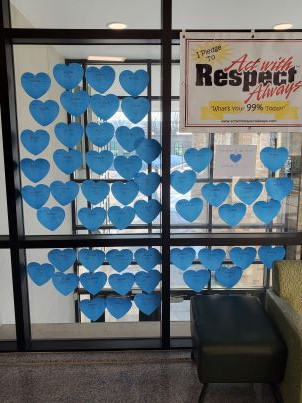“. . . so He guided them to their desired haven.” Psalm 107:30b
Every time I hear a human trafficking story, I think, “What if that were one of my children!” I am vaguely aware that the problem exists within my community, but I feel hopeless to do anything about it. Perhaps you can relate.
I recently met a young woman, Taylor Money, who has dedicated her life and career to promoting awareness of human trafficking with hopes of preventing more victims to these atrocious crimes. In a recent phone interview, Taylor shared practical tips for me to share with you, but first, let me share a bit about her personal story which will shed insight into why she is so passionate about her work.

Taylor Money has a childhood she would rather not talk about. “As a child, I dealt with certain situations that children really shouldn’t. . . and from the ages of 15-21 I was homeless on and off,” Taylor explained.
At the age of twenty-one, Taylor became pregnant with her first child which was a turning point for her. She had already dropped out of college twice, but with a child on the way, she was determined to finish. She enrolled in school online while network marketing from home to help pay the bills. Four years later, she graduated with a Bachelor of Arts degree in Criminal Justice with a certificate in cyber-crime.
Taylor found her niche when she was hired by Catholic Charities of Herkimer County, NY, to coordinate Herkimer County’s Safe Harbour program which is part of a state-wide network operating out of the New York State Office of Children and Family Services. “We do human trafficking prevention and also advocating for those who have already dealt with those issues,” Taylor said.
“From a very early age my experiences molded me to be that defender for other people,” Taylor said. “Looking back as an adult now, I see how lucky I am. . . One wrong decision or one wrong place/wrong time, and I could have easily not have been here.”
Much of Taylor’s work at Safe Harbour is focused on the prevention of human trafficking and sexual exploitation. She works with different agencies throughout the county and offers training at police departments, schools, colleges, and other settings. She also networks to identify at-risk youth and provides resources and mentorship programs. For those who have been affected by trafficking, she seeks out interventions on their behalf.
Taylor recently hosted a program at Herkimer High School for awareness month. She taught an internet safety course to the sixth and seventh graders and then followed up with the “Blue Heart Pledge” event, patterned after the international anti-trafficking Blue Heart Campaign. Each of the students wrote down an action step on a small blue heart they would take towards internet safety such as using stronger passwords or not sharing personal information online. The hearts were hung in the hallway at the school as a reminder for the students of the pledges they had made.

Taylor has some tips she would like to share with you, but first, she would like to make a few points. Wherever you live, in a city or in a rural setting, human trafficking is a problem. Just because you are not hearing about this on your local news station doesn’t mean it doesn’t exist. Because of the sensitive nature of the subject, it is not always reported.
Taylor also points out that our culture pushes sex through the music industry, advertisements, and the fashion industry. This has led to self-exploitation which isn’t always recognized or reported. “If they are in control of their own exploitation, they seem to think it is okay,” Taylor said.
“Social media is the biggest monster in this,” Taylor said. “It’s no longer the guy in the white van grabbing kids . . . they are using social media to find victims. . . they form a relationship with them without even meeting them, and they gain their trust.”
Taylor emphasizes that everyone has an important role in stopping human trafficking. Low self-esteem plays a role in youth falling into the hands of predators. Whether you are a parent, teacher, aunt or uncle, next-door neighbor, or the store owner down the street, you can make a difference in the life of a young person by valuing them as a person and helping them to embrace their uniqueness and special role within our community.
Taylor stresses that awareness is key. These are some warning signs you should look for:
1. Does your teen have expensive items they couldn’t possibly afford to buy for themselves or strange things such as hotel or car keys?
2. Is your child hanging around older teens or adults at the exclusion of family or friends their own age? Does anyone seem to have control over them?
3. Is your teen in the habit of not coming home at night? What are the excuses they are giving?
4. Are you aware of all your teen’s activities and contacts on social media?
“What do I do if I see the signs?” you may be thinking. Taylor says not to panic; you are not alone. If you live in Herkimer County, call Taylor. She will walk you through the next steps (315-894-9917).
Wherever you live, you can call the National Human Trafficking Hotline at 1-888-373-7888 or text HELP or INFO to 233733. Taylor said it is especially important to spread the word about how to text the hotline. Youth are more likely to text than make a phone call, and it is a way they may be able to reach out for help without being detected.
“If you see something, say something,” Taylor said. “We are here to help you!”
Helpful Resources:
National Human Trafficking Hotline webpage
Safe Harbour Herkimer County Facebook page
*Background photo by ChiernSeherin from Pixabay